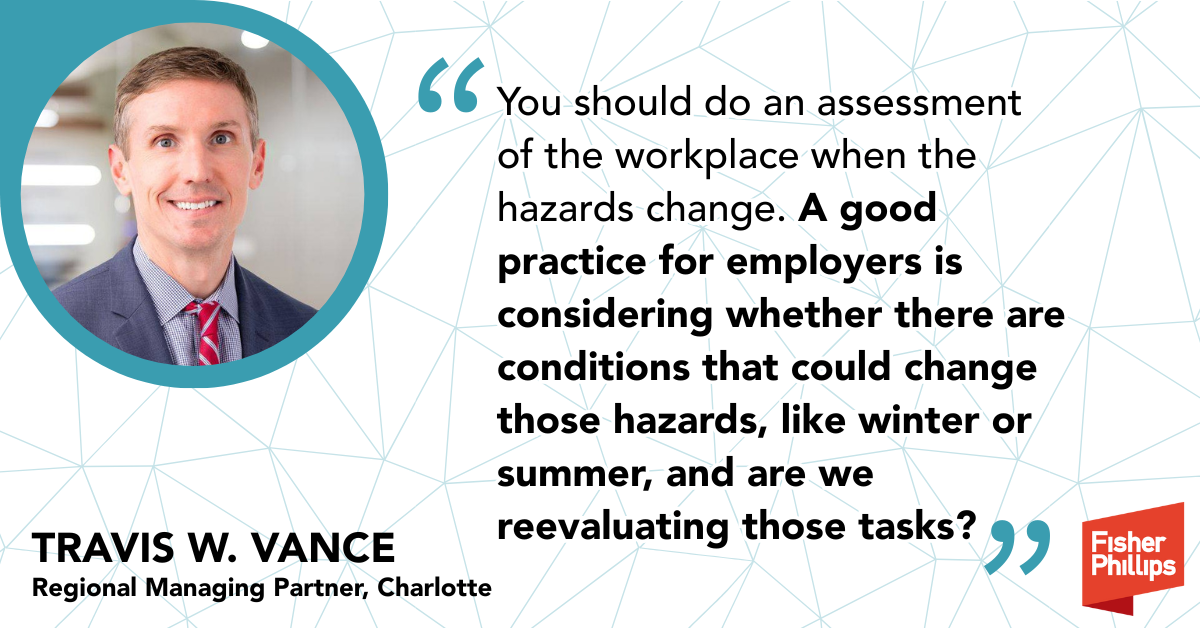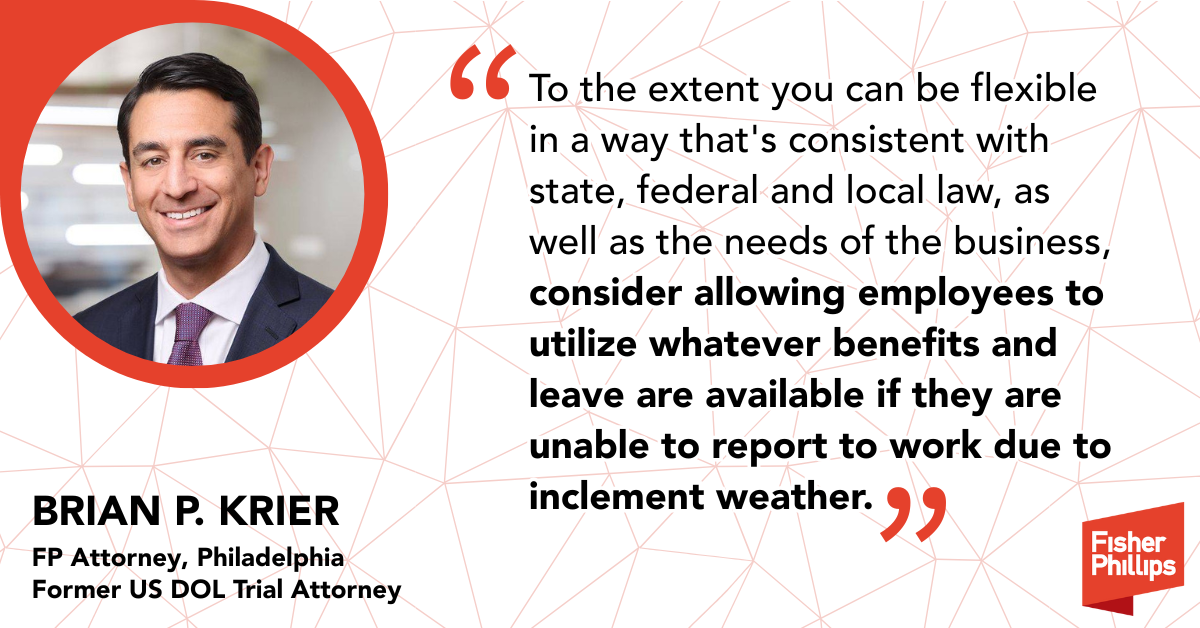With the winter season and snowier conditions just around the corner, is your business prepared for the cold weather safety and leave requests that are also on the forecast? When snow or ice makes it difficult for staff to travel to work or forces you to close your operations altogether, you may be obligated to pay certain employees. And while there are no specific federal rules on keeping workers safe in the cold, employers still face legal obligations to maintain a safe workplace. Here are a few important reminders and how to handle inclement weather-related leave requests.
Risks Rise When the Temperature Drops
The lower average temperatures that come along with the winter season present health-related safety risks for employees that primarily work outside. There are currently no federal regulations requiring employers to take specific precautions due to cold weather, but employers do have a legal obligation to maintain a workplace free from hazards.
Employers should conduct a hazard assessment to determine what steps will protect their staff from freezing temperatures, said Travis Vance, Regional Managing Partner of FP’s Charlotte office and a key member of the Workplace Safety team.
“You should do an assessment of the workplace when the hazards change,” he recommended. “A good practice for employers is considering whether there are conditions that could change those hazards, like winter or summer, and are we reevaluating those tasks? Is the PPE that we’re using in the summer appropriate for the winter and vice versa.”
|
How To Keep Safe in the Cold The Occupational Safety and Health Administration (OSHA) recommends employers:
|
Employers should also be mindful of the tangential issues that can crop up from the colder weather, like risks created by employees wearing additional clothing.
For example, an employee wearing thick winter gloves could get caught in a machine, or an employees’ goggles may fog up due to the change in temperature. Vance said managers should be trained to recognize the appropriate safety equipment required and whether alternative personal protective equipment is available.
It’s important to have a line of communication with those employees so they're not just left literally out in the cold, Vance said.
Snow Days and Pay Headaches
Wet, windy, winter conditions can also interrupt operations. When it comes to making a call about keeping your firm open or allowing staff to work remotely, there are a few important distinctions to keep in mind.
Non-Exempt Employees
Your pay obligations will depend on whether an employee is exempt or non-exempt from minimum wage and overtime requirements. The Fair Labor Standards Act (FLSA) requires you to pay non-exempt employees for all hours worked. So, even if your worksite is closed, if non-exempt staff are working remotely, you should record and pay for all hours worked.
On the other hand, if your non-exempt employees are unable to work at all due to inclement weather, you are not required to pay them under federal law for time not worked. However, Brian Krier, an attorney in FP’s Philadelphia office and former trial attorney with the US Department of Labor, cautions that employers should familiarize themselves with state and local laws in the areas where they operate, which may have stricter requirements than at the federal level. For example, California has reporting-time and on-call pay requirements.
Exempt Employees
Overtime-exempt employees typically must be paid their full salary for any week in which they perform work. So, if your operation shuts down for only part of the week due to snow, or your staff is working remotely for any part of the week, you will still have to pay exempt employees their salary as usual (so long as they worked for a portion of the workweek).
You can, however, require exempt employees to use accrued paid time off (PTO) in certain circumstances, including for full day business closures. But if an exempt employee has no available PTO, you still need to pay them their full week’s salary if any work is performed. Only a full week business closure can be unpaid for exempt employees, and only if no work is performed during the entire workweek.
Note that the rules differ when the business remains open, and an employee is taking time off for personal reasons with no PTO available. In that case, you may deduct pay, but only for a full day absence and only if no work is performed.
You will also have to ensure compliance with state wage and hour laws, which may offer employees more protections than federal law. The rules get complicated, so it’s best to reach out to legal counsel before making any deductions.
Don’t Freeze Out Staff
Whether or not to require employees to use PTO for weather closures is a business decision, and you may want to consider the impact on operations as well as employee morale.
While there is no federal obligation to pay hourly employees for days where weather makes commuting difficult, flexibility is important, Krier noted. To the extent you can be flexible in a way that's consistent with state, federal and local law, as well as the needs of the business, consider allowing employees to utilize whatever benefits and leave are available to them if they are unable to report to work due to inclement weather.
Ensure your policies are clear, properly communicated with employees, and consistently applied.
Conclusion
If you have any questions, contact your Fisher Phillips attorney, the authors of this Insight, or any attorney on our Wage and Hour or Workplace Safety teams. We’ll continue to monitor these developments and provide timely updates as they occur, so make sure you are subscribed to Fisher Phillips’ Insight System to get the most up-to-date information directly to your inbox.







